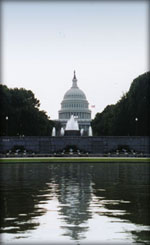 | 
 "Washington's Other Scandal" reveals the heart of a Washington where money - not sex - is the obsession. In this special report by Bill Moyers, FRONTLINE shows how both political parties, cynically and shamelessly, contrived to bend and break campaign laws in the '96 election.
"Washington's Other Scandal" reveals the heart of a Washington where money - not sex - is the obsession. In this special report by Bill Moyers, FRONTLINE shows how both political parties, cynically and shamelessly, contrived to bend and break campaign laws in the '96 election.
In his 1992 campaign, Bill Clinton vowed to clean up the country's campaign money system. However, in his 1996 re-election campaign, he ran one of the most reckless fund-raising operations in the history of American politics. The story is told through candid interviews with former Clinton political consultant Dick Morris, former White House deputy chief of staff Harold Ickes and former DNC Chairman Donald Fowler all of whom were caught up in the fundraising frenzy. In addition, this FRONTLINE report uses White House videotapes - never meant to be seen by the public - to reveal the private conversations at intimate fundraising dinners and the infamous White House coffees.
Examining the Republican side of the campaign, "Washington's Other Scandal" exposes shell organizations like the company called Triad which were established to accept large donations outside the limits of the law and offer anonymity to wealthy donors. There was an explosion of such groups laundering money through tax-exempt fronts. Former Senate Committee counsel, Elizabeth Stein explains how they raised millions for tv ads for Republican candidates in the last weeks of key campaigns.
The film ends with the story of promises made and broken by campaign fund raisers, looking at the case of Oklahoma's impoverished Cheyenne/Arapaho tribes engulfed not only by the frenzied chase for campaign dollars, but also - after the '96 election - by Washington operators who continued to try to fleece them.
"In the 1996 campaign, unfortunately, a 'for sale' sign was hung up on the democratic process," Senator Joseph Lieberman tells Moyers. "And that's why I say that our great democracy ended up in a dark hole, far from the vision and values of the people who founded America."
In December 1998 Janet Reno decided not to seek the appointment of an independent counsel to examine 1996 campaign abuses, saying there was "clear and convincing evidence that the President and Vice President lacked the criminal intent to violate the law." However, some experts are arguing that money - or access to money - has been so exclusionary in the electoral process that it amounts to a denial of basic civil rights. And, in the end they say, it's a constitutional issue and will be left to the courts to decide.
 |  |  |